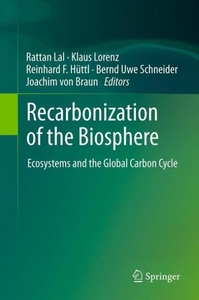Recarbonization of the Humid Tropics
Venter, Michelle, Venter, Oscar, Laurance, Susan, and Bird, Michael (2012) Recarbonization of the Humid Tropics. In: Lal, Rattan, Lorenz, Klaus, Hüttl, Reinhard F., Schneider, Bernd Uwe, and von Braun, Joachim, (eds.) Recarbonization of the Biosphere. Springer, Dordrecht, The Netherlands, pp. 229-252.
![[img]](https://researchonline.jcu.edu.au/23101/4.hassmallThumbnailVersion/23101_Venter_et_al_2012_Book_Cover.jpg)
|
Image (JPEG) (Book Cover)
- Cover Image
Download (117kB) |
|
|
PDF (Published Version)
- Published Version
Restricted to Repository staff only |
Abstract
To curb the effects of anthropogenic carbon (C) emissions, it is essential to explore the capacity of natural ecosystems to store and sequester atmospheric C. Tropical humid forests store most of their carbon in their above ground biomass which can be rapidly depleted by extractive industries or rapidly replenished through natural regeneration or reforestation. This rapid exchange of carbon dioxide between the forest and the atmosphere make humid tropical forests one of the most dynamic C pools on Earth. Tropical humid forests act as a store and sink for C, but are also the source of almost all anthropogenic C emissions from the land-use and land-use change. The influence of tropical humid forests also extends far beyond the edges of their canopies, affecting global C cycles, biodiversity, hydrological cycles, and the livelihoods of millions of rural people. These interlinked factors are what make tropical humid forests one of the most compelling actors in the recarbonization of the biosphere. This report presents the current state of knowledge on C stocks and fluxes in humid tropical forests, and investigate management interventions for the recarbonization the humid tropics. The C sequestration potential of seven recarbonization options is explored as well as co- benefits, risks and costs. Finally, relevant policies that could be harnessed to encourage recarbonization in humid tropics are reviewed.
| Item ID: | 23101 |
|---|---|
| Item Type: | Book Chapter (Research - B1) |
| ISBN: | 978-94-007-4158-4 |
| Keywords: | tropical humid forest; REDD; carbon sequestration; agroforestry; restoration plantings; humid tropics; extractive industry; carbon pool; anthropogenic carbon emissions; sink for atmospheric carbon; management interventions; carbon sequestration potential; reduced impact logging; plantation |
| Related URLs: | |
| Date Deposited: | 17 Jan 2013 05:53 |
| FoR Codes: | 05 ENVIRONMENTAL SCIENCES > 0502 Environmental Science and Management > 050209 Natural Resource Management @ 100% |
| SEO Codes: | 96 ENVIRONMENT > 9603 Climate and Climate Change > 960305 Ecosystem Adaptation to Climate Change @ 50% 96 ENVIRONMENT > 9603 Climate and Climate Change > 960302 Climate Change Mitigation Strategies @ 50% |
| Downloads: |
Total: 329 Last 12 Months: 3 |
| More Statistics |



